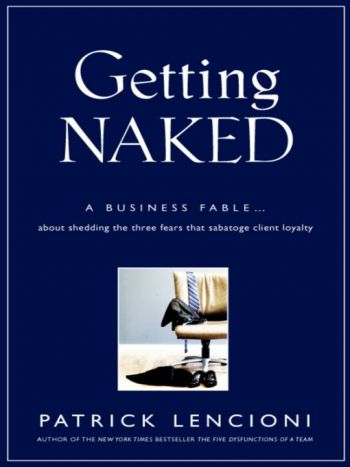Check your ego at the door for better client service
Book Review: Patrick Lencioni’s Getting Naked bares simple business secrets
- |
- Written by Paul Jarosz
- |
- Comments: DISQUS_COMMENTS
 Getting Naked: A Business Fable About Shedding The Three Fears That Sabotage Client Loyalty, By Patrick Lencioni, Jossey-Bass, 240 pp., 2010
Getting Naked: A Business Fable About Shedding The Three Fears That Sabotage Client Loyalty, By Patrick Lencioni, Jossey-Bass, 240 pp., 2010
Patrick Lencioni may be familiar to many readers, as he is an accomplished speaker and author of several popular business management books. Many have catchy titles. His latest, Getting Naked, is no different.
As he explains in his introduction, “getting naked” actually means being vulnerable in business dealings. (My guess is that the publisher’s research indicated that Getting Vulnerable would not be as eye-grabbing on bookseller’s shelves as Getting Naked.) While we are expected to project strength and confidence in our business dealings, Lencioni’s main premise is that acting vulnerable, meaning, checking your ego for the benefit of the client, can actually pay off in increased customer loyalty and greater business success.
A lesson for banks in the merger cycle
The plot of this business fable is straightforward: “Kendrick and Black,” a prestigious internal business management firm, buys out one of its rivals. That firm, “Lighthouse Partners,” is a small boutique management company. Our hero, Jack Bauer (no relation to Kiefer Sutherland), is assigned to oversee the merger. His marching orders include finding out how Lighthouse operates and then deciding which of Lighthouse’s processes and ideas to fold into Kendrick and what (or who) from Lighthouse to jettison.
Although Kendrick and Lighthouse are management firms, this portion of the fable does have some applicability to banking. Bank mergers, both voluntary and involuntary, are quite commonplace nowadays—and some say many more are coming. After the smoke clears, the surviving institution must then face the difficult task of merging two bank cultures, which are often quite dissimilar.
In theory, the best of both will be integrated into the new organization. But in most cases the acquirer just imposes its policies and procedures on the acquired bank. Lencioni makes the point that the operations of the acquirer are not necessarily better and putting ego and preconceived notions aside, it might be a good idea to adopt some of the ideas of the acquired bank.
Not surprisingly, Jack Bauer’s natural inclination is to assume that Kendrick’s methods are superior and to dismiss the ways of Lighthouse. But as he comes to know the staff and operations of Lighthouse, he has a change of heart by the end of the book. (Remember, this is fiction.)
Overcoming three fears about “naked service”
So what about getting naked? Lencioni states that naked service calls for a service provider to demonstrate vulnerability to “embrace uncommon levels of humility, selflessness and transparency for the good of the client.”
In other words, another twist on improving customer service. (More applicability to banking.) It’s a given that banking is more or less a commodity and that the only way to differentiate our institutions from our competitors is by being innovative and offering extraordinary customer service. Since customers are willing to pay a premium for good customer service, who doesn’t want to be known as the next Ritz Carlton or Lexus of banking?
So what does Lencioni say? He expands on the concept of getting naked by describing three fears that you must be willing to confront.
The first is the Fear of Losing the Business.
He breaks this down into four separate principles. Presenting a customer with unvarnished truth, and sacrificing short-term revenues to set the stage for a long-term relationship are just two examples.
From a banking perspective, this Fear definitely has relevance when courting new retail or lending customers. Helping a customer select a deposit product that best suits his or her needs or assisting a commercial lending customer in formulating a lending package come to mind. Another suggestion: Going easy on fees.
The second is the Fear of Being Embarrassed.
Lencioni breaks this down to three principles. Examples include admitting that you don’t know a customer’s business or risking looking foolish by offering untested suggestions. This section would seem to be more applicable when dealing with commercial lending customers, as lenders become more intimately involved with their customers’ financial and day-to-day operations than retail folks.
The third is the Fear of Feeling Inferior.
To me, this seems to be an extension of the Fear of Being Embarrassed. Yet Lencioni manages to add a few points by further splitting this up among four more principles. I think they can all be summarized as just checking your ego at the door and letting the world revolve around the client. Can’t argue with that.
Reviewer’s recommendation
Between the three Fears, eleven principles, and various asides sprinkled throughout the book, Lencioni puts forth a number of good management suggestions. But will reading Getting Naked teach you new game-changing management skills? Probably not. Will you pick up some nuggets that you can employ in your day-to-day responsibilities? Probably yes.
For my money, you’d be better off reading Lencioni’s previous book, Death by Meeting. It’s more insightful.
If you do decide to read Getting Naked, you may want to remove the book jacket, in order to avoid funny looks in public.
Want more banking news and analysis?
Get banking news, insights and solutions delivered to your inbox each week.
Tagged under Books for Bankers,













